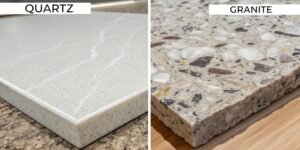Are you worried that a hot pan will ruin your new quartz countertop? The fear of a single mistake causing a permanent, ugly mark is real. Here is what you need to know.
Yes, artificial quartz is heat resistant, but it is not heat-proof. Our quartz slabs contain about 90-93% natural quartz and a resin binder. This resin can be damaged by very high temperatures, so you should always use trivets for hot cookware from the stove.
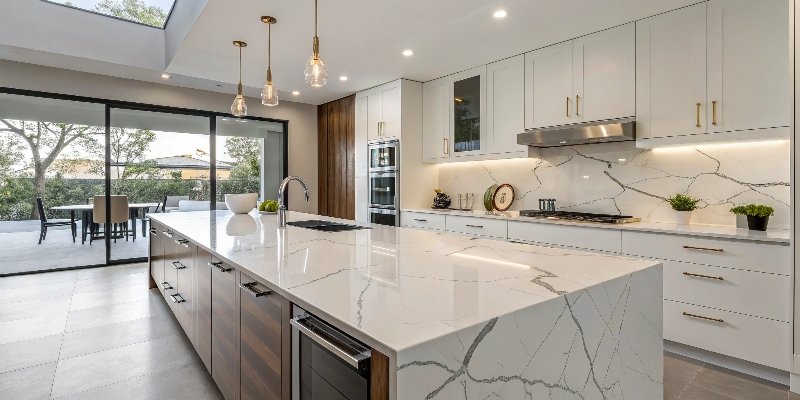
This is one of the most common questions I get from clients like Rajiv, a procurement manager who needs materials that are both beautiful and durable. He needs to trust the products he chooses for his projects. It is important to understand how quartz behaves with heat to keep it looking great for years. Let's look at this in more detail.
Is engineered quartz heat resistant?
You're choosing a new countertop and need to know if it can handle the kitchen's heat. Making the wrong choice can lead to expensive damage and regret. Let's break down its real heat resistance.
Engineered quartz is heat resistant because of its high content of natural quartz. However, the resin used to bind the stone can be damaged by temperatures over 150°C (300°F). So, while it resists moderate heat, you must protect it from extreme heat.
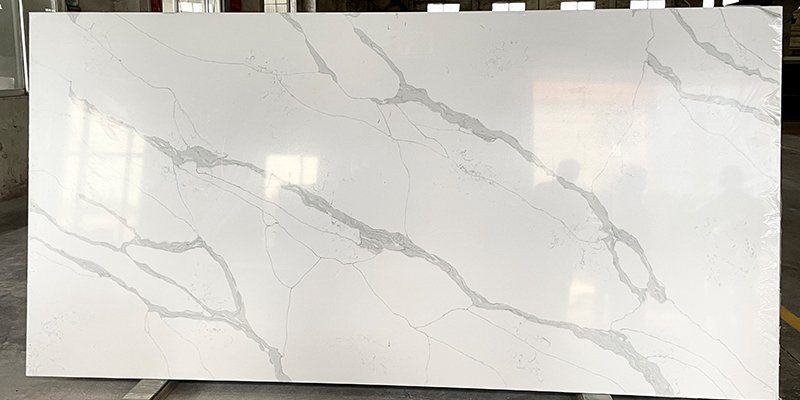
Engineered quartz is made of 90-93% natural quartz crystals, which are extremely hard and durable. The rest is a mix of polymer resins and pigments. The resin is what makes the slab non-porous and flexible, but it's also the part that can't handle high heat. I remember a client in Italy a few years ago. He installed our quartz in a high-end kitchen, but his customer put a hot skillet right on the counter. The heat damaged the resin and left a faint burn mark. We replaced the slab, but it taught us an important lesson. Now, I always tell my clients to use trivets for anything coming off the stove. The slab can handle warmth, but not direct, intense heat.
Does quartz get damaged by heat?
You love the clean look of your quartz surface but live in constant fear that a hot pot might ruin it. One small mistake could leave a permanent mark. Here is how to know what heat damage looks like and how to prevent it.
Yes, quartz can be damaged by direct and prolonged contact with high heat. The heat can cause the resin to burn, leading to discoloration or permanent yellowing. In extreme cases, a sudden temperature change, or thermal shock, can even cause the slab to crack.
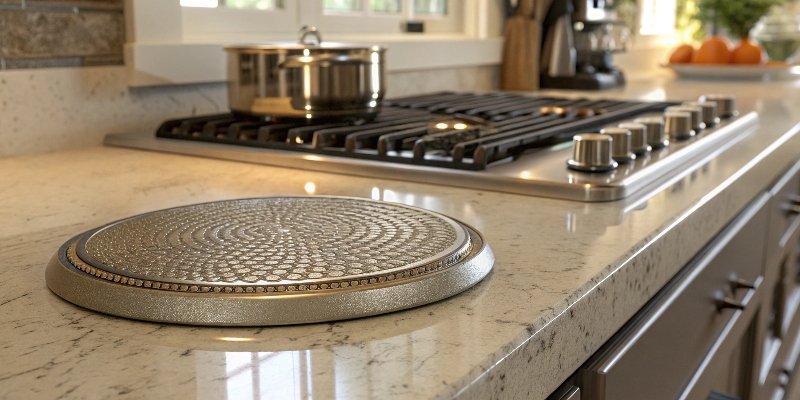
I’ve seen how different types of heat can affect quartz over my years in the business. The most common issue is discoloration. The resin reacts to the heat and can change color, leaving a permanent stain. Another thing to watch out for is outdoor use. I had a client in Dubai who wanted to use our quartz for an outdoor BBQ area. I advised against it based on a case in Qatar where a quartz surface turned yellow after a year of sun and heat exposure. The UV rays and high temperatures can degrade the resin over time. To keep your quartz safe, it's best to follow some simple rules.
| Do's | Don'ts |
|---|---|
| Use trivets for hot pots and pans | Place hot cookware directly on the surface |
| Use heat pads for appliances like crock pots | Use quartz for outdoor kitchens in direct sun |
| Wipe up spills quickly | Cut directly on the surface (use a board) |
Which stone is most heat resistant?
Are you searching for the perfect countertop for a busy kitchen that sees a lot of action with hot pans? Choosing a material that can't take the heat will only lead to disappointment. Let's compare the top stone options available.
For pure heat resistance, natural stones like granite and soapstone are superior to engineered quartz. These materials were formed by intense heat and pressure, so they can generally handle a hot pan placed directly on them. However, every material has its trade-offs.
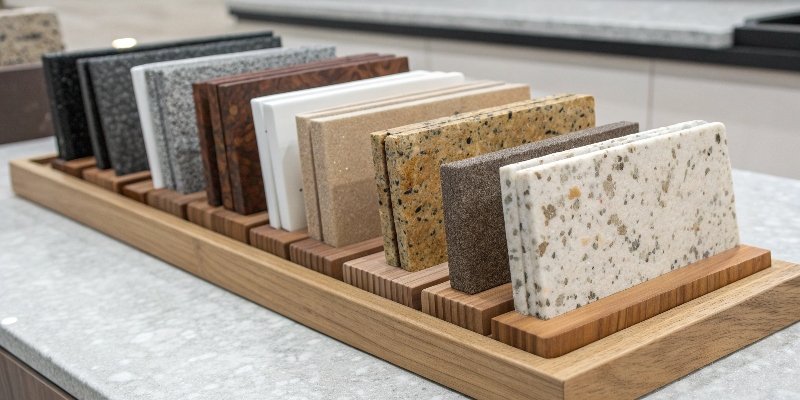
When clients ask me for the most heat-resistant option, I explain the differences between the most popular materials. While quartz is an excellent all-around choice, other stones perform better with high heat. Granite is created by volcanic activity, so it naturally handles high temperatures very well. Soapstone is another fantastic option and is so heat-resistant that it's often used in science labs. Marble, on the other hand, is softer and can scorch more easily. However, quartz has major advantages in other areas. It is non-porous, so it resists stains much better than granite or marble. It also comes in consistent, uniform patterns. The best choice depends on your priorities.
| Stone | Heat Resistance | Maintenance | Stain Resistance |
|---|---|---|---|
| Quartz | Good | Low | Excellent |
| Granite | Excellent | Medium (needs sealing) | Good |
| Marble | Fair | High (needs sealing) | Fair |
| Soapstone | Excellent | Medium (needs oiling) | Excellent |
Can you put a hot mug on quartz?
Do you just want to enjoy your morning coffee without worrying about your countertop? The thought that even a simple hot mug could be a problem is stressful. Here is the simple, clear answer you need for your daily routine.
Yes, you can place a hot mug of coffee or tea on your quartz countertop. The temperature of a hot beverage is not high enough to damage the resin in the quartz. It is everyday items like hot skillets from the stove that you need to be careful with.
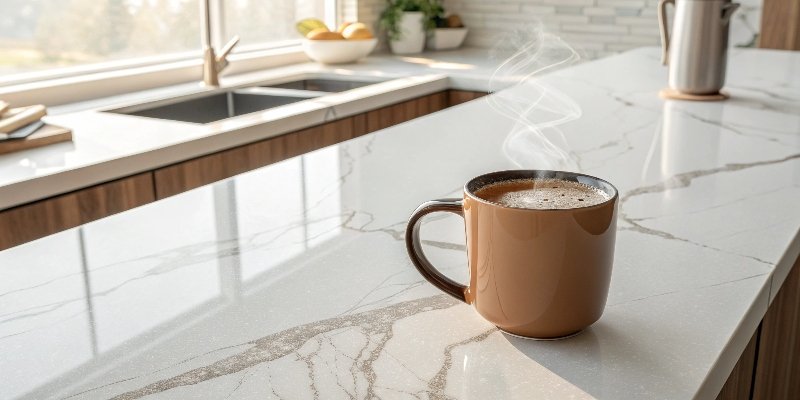
This is a practical question I get all the time. It’s important to distinguish between different levels of heat in the kitchen. A hot mug of coffee is usually around 80-90°C (175-195°F). Our quartz slabs are designed to withstand temperatures up to 150°C (300°F) without any issues. The real danger comes from cookware taken directly off a hot burner or out of the oven, which can be much hotter. So, for everyday activities like placing down your coffee or a warm plate, you don’t need to worry. Your quartz countertop is more than strong enough to handle it. While you don't need a coaster for heat, it's still a good idea to use one to prevent coffee rings and stains, especially on lighter-colored slabs.
Conclusion
In short, quartz is very heat resistant for everyday kitchen use but it is not completely heat-proof. Always use trivets for hot pots and pans to protect the resin and keep your countertop beautiful.





